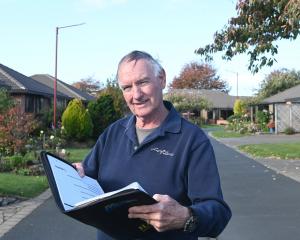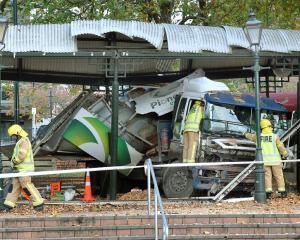The ''people power'' that has resulted in legal highs being banned can also help cut this country's unacceptably high workplace death toll, Dunedin South MP Clare Curran says.
She was commenting in an address to about 35 people at the Otago Workers Memorial in the Market Reserve, Dunedin, yesterday, during a commemorative function to mark International Workers Memorial Day.
During the event, the names of 54 people who had died in workplace accidents in Otago-Southland since the early 1990s were read out, and a small white cross was placed in the ground to mark each death.
Ms Curran, in an interview, said the campaign to ban legal highs, also known as party pills, had shown the effectiveness of people power and family power, the latter involving the relatives of people who had been adversely affected by taking party pills.
Those concerned relatives had refused to be discouraged and had continued to campaign for legal highs to be banned, she said.
The same kind of people power, and the same determined approach from the relatives of people who had been killed at work, could also play a crucial role in helping to improve New Zealand's poor workplace safety record.
All workplace deaths were, ultimately, avoidable.
But more action was needed to ''join the dots'' and to develop a more comprehensive and well co-ordinated government policy approach to workplace safety, she said.
The key to making improvements was to keep working together and to maintain the focus on the long hours and unsafe working conditions, low pay and an over-dominant management approach in forestry and some other industries, she said.
Kris Smith, who is a member of the Unions Otago executive, also spoke and noted that in Wellington on Sunday, the Council of Trade Unions had observed International Workers Memorial Day with more than 100 family members of forestry workers killed at work.
The 54 deaths in the forestry sector over the past 10 years had ultimately resulted from the ''deregulation of the sector'' and the ''wholesale cuts to terms and conditions of work'' that had hit the forestry sector particularly hard.
Forests used to be largely state-owned and workers were once employed directly.
Now there were more than 15,000 forest owners and ''an absolute plethora'' of contractors, subcontractors and forest worker crews.
Subcontractors were under pressure and the wages of ordinary workers as a share of profits had fallen from about 70% in the 1980s to about 20% today.
''Very experienced forestry workers are earning between $16 and $17 an hour with no penal rates and poor provision of breaks,'' she said.












